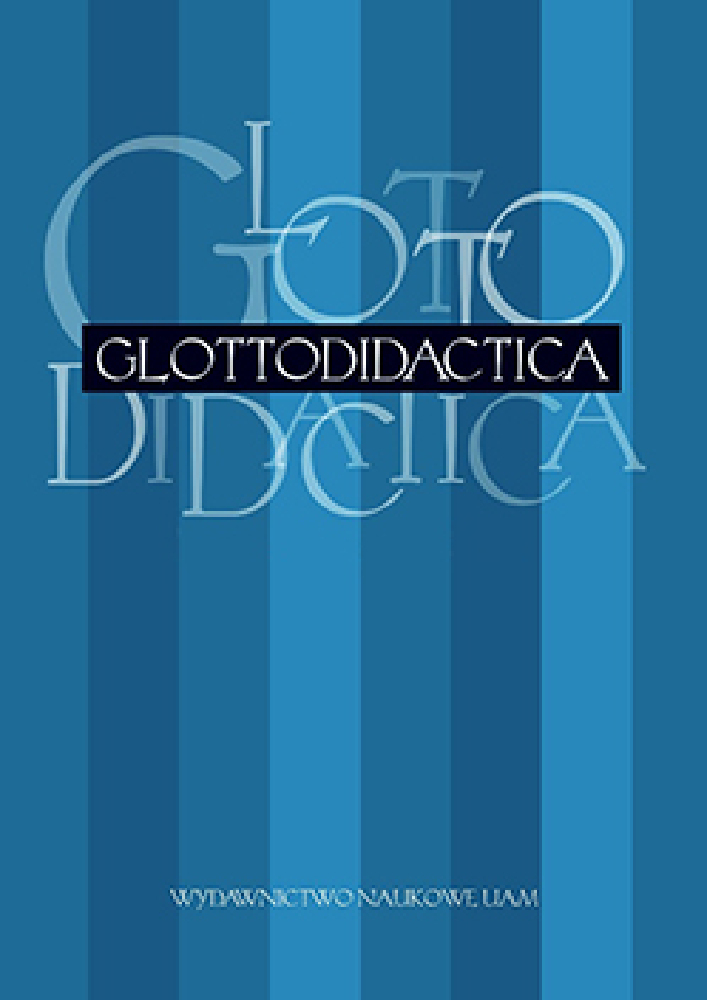Abstract
The paper deals with the problem of balance maintenance of natural languages in the context of foreign language teaching. A new paradigm of foreign language teaching in the following triad: native language – global language – second foreign language is proposed. Translingualism is treated as the only means of maintaining linguistic balance between natural languages viewed from an ecolinguistic perspective.References
Baker, C., 2001. Review of Tove Skutnabb-Kangas „Linguistic Genocide”. In: Journal of Sociolinguistics 52, 279–283.
Duff, P., N. Hornberger (eds). 2008. “Encyclopedia of Language and Education”. Language Socialization. New York: Springer Science and Media LLC.
Fill, A., 1998. Ecolinguistics – State of Art 1998. In: Arbeiten aus Anglistik und Amerikanistik 1, 1–16.
Fill, A, 2001. Language and Ecology: Ecolinguistic Perspectives for 2000 and Beyond. In: Applied Linguistics for the 21st Century: AILA Review 14, 60–75.
Fill, A., P. Mühlhauser (eds), 2001. The Ecolinguistic Reader. Language, Ecology and Environment. London: Continuum.
Fishman, J, W. Conrad, A. Rubal-Lopez (eds), 1996. Post-Imperial English. Status Change in former British/American colonies, 1940–1990. Berlin–New York: Mouton de Gruyter.
Hajer, M., 1995. The Politics of Environmental Discourse: Ecological Modernization and the Policy Process. Oxford: Claredon Press.
Halliday, M., 2001. New ways of Meaning: Challenge to Applied Linguistics. In: A. Fill and P. Muhlhausler (eds): The Ecolinguistic Reader: Language, Ecology and Environment: London: Continuum Press. 175–186.
Haugen, E., 1971, The Ecology of Language. The Linguistic Reporter. Supplement 5, 19–26.
Haugen, E., 1972. The Ecology of Language. Essays by Einar Haugen. London: Stanford University Press.
Jacobs, G., A. Goalty. 2000. The Treatment of Ecological Issues in Coursebooks. In: ELT Journal 54, 256–264.
Jung, M., 2001. Ecological criticism of language. In: The Ecolinguistic Reader. Language, Ecology and Environment 68, 4–10.
Mufwene, S., 2001. The Ecology of Language Evolution. Cambridge University Press.
Mühlhausler, P., 1996. Linguistic Ecology. Language Change and Linguistic Imperialism In the Pacific Region. London: Routledge.
Mühlhausler, P., 2003. Language of Environment – Environment of Language. A Course in Ecolinguistics. New York: Battlebridge.
Mühlhausler, P., 2005. Language Planning and Language Ecology. In: Current Issues in Language Planning 1, 347–255.
Pennycook, A., 1994. The Cultural Politics of English as an International Language. London: Longman.
Phillipson, R., T. Skutnabb-Kangas, 1996. English Only Worldwide or Language Ecology. In: TESOL QUARTERLY 30 (3), 429–452.
Puppel, S., J. Puppel, 2005. Zagadnienie percepcji języka naturalnego w triadzie: język ojczysty – język globalny – język sąsiedni na przykładzie triady: język polski – język angielski – język niemiecki w ujęciu ekolingwistycznym: próba typologii. In: Scripta Neophilologica Posnaniensia VII, 55–96.
Puppel, S., 2007a. Interlingwalizm czy translingwalizm? Interkomunikacja czy transkomunikacja? Uwagi w kontekście współistnienia języków naturalnych w ramach globalnej wspólnoty kulturowo-językowo-komunikacyjnej. In: Scripta de Communicatione Posnaniensi, Seria: Prace Naukowe Katedry Ekokomunikacji UAM I, 27–43.
Puppel, S., 2007b. Tężyzna języków naturalnych. In: Halina Chałacińska-Wiertelak / K. Kropaczewski (eds.), Dyskurs wielokulturowy. Poznań: Wydawnictwo Naukowe UAM, 15–25.
Puppel, S., 2007c. Ochrona języków naturalnych. In: Scripta de Communicatione Posnaniensi. Seria: Materiały Dydaktyczne Katedry Ekokomunikacji I, 221–230.
Ruiz, R., 1984. Orientations in language planning. In: National Association for Bilingual Association (NABE) 8 (2), 15–34.
Shultz, B., 2001. Language and the Natural Environment. In: Fill, A. and Mühlhausler, P. (eds) The Ecolinguistics Reader. London: Continuum, 109–114.
Skunabb-Kangas, T., 2000. Linguistic Genocide in Education – or Worldwide Diversity and Human Rights? New York: Lawrence Earlbaum Associates.
Trim, J., 1959. Historical, Descriptive and Dynamic Linguistics. In: Language and Speech 2 (1), 9–25.
UNESCO, 2003. Language Vitality and Endangerment. In: UNESCO Intangible Cultural Heritage Unit’s Ad Hoc Expert Group on Endangered Languages. Approved 31 March 2003 by the Participants of the International Expert Meeting on UNESCO Programme Safeguarding of Endangered Languages 1, 10–12.
Wendel, J., 2005. Notes on the Ecology of Language. In: Bunkyo Gakuin University Academic Journal 5, 511–516.
Widdowson, H., 1999. Coming to Terms with Reality: Applied Linguistics in Perspective. In: 12th Congress of Applied Linguistics, AILA 99, 69–76.
Wilson, G., 1999. Environmental Education in Taiwan: The Mountain Program. In: Global Issues in Language Education Network Newsletter 1, 12–13.
http://portal.unesco.org./culture/en/ev.php=URL_ID=8270&URL_DO=DO_TOPIC&URL_SECTION=201.html.
Martin, P.W., Creese, A., Bhaat, A. and Bhojani, N., 2004 Final Report on Complementary S. Schools and their Communities in Leicester. Leicester University/University of Birmingham. http://le.ac.uk./education/research/complementary schools/index.html
Pitts, M., J.F. Nussbaum, 2006. „Integrating the Past and Paving the Future. Examining the Current Trends and Extending the Boundaries of Language and Social Psycho Research. Journal of Language and Social Psychology. Vol. 25, N 3, 197–202, Sage (http://oneline.sagepub.com).
UNESCO, 2003. “Recommendations for Action Plan”. International Expert Meeting on UNESCO Programme Safeguarding of Endangered Languages, UNESCO, Paris
Fontenoy, 10–12 March 2003. (http://portal.unesco.org/culture/en/ev.php.URL_ID11992& URL_DO=DO_TOPIC&URL_SECTION=201.html).
License
Authors
Authors of texts accepted for publication in Glottodidactica are required to complete, sign and return to the Editorial team’s office the Agreement for granting a royalty-free license to works with a commitment to grant a CC sub-license.
Under the agreement, the authors of the texts published in Glottodidactica grant Adam Mickiewicz University in Poznań a non-exclusive, royalty-free license and authorize the use of Attribution-NoDerivatives 4.0 International (CC BY-ND 4.0) Creative Commons sub-license.
The authors retain the right to the free disposal of the work.
Users
Interested Internet users are entitled to use works that have been published in Glottodidactica since 2016, under the following conditions:
▪ attribution – obligation to provide, together with the distributed work, information about the authorship, title, source (link to the original work, DOI) and the license itself.
▪ no derivatives – the work must be preserved in its original form. Without the author's consent, it is not possible to distribute the modified work in the form of translations, publications, etc.
Copyrights are reserved for all texts published before 2016.
Miscellaneous
Adam Mickiewicz University in Poznań retains the property right as a whole (layout, graphic form, title, cover design, logo etc.).
Privacy statement
The names and email addresses published on this journal site will be used exclusively for the purposes declared by this journal and cannot be used for any other purpose or by any other party.




